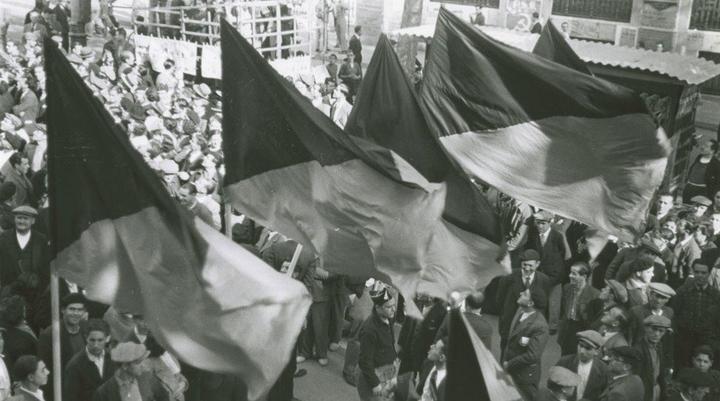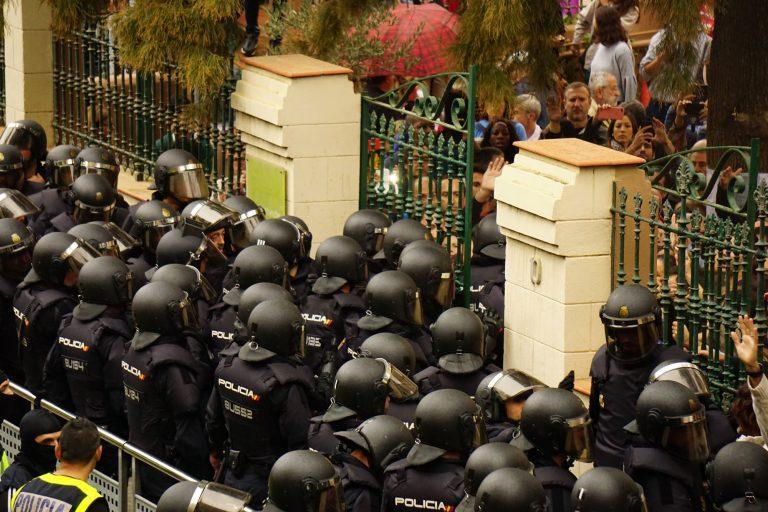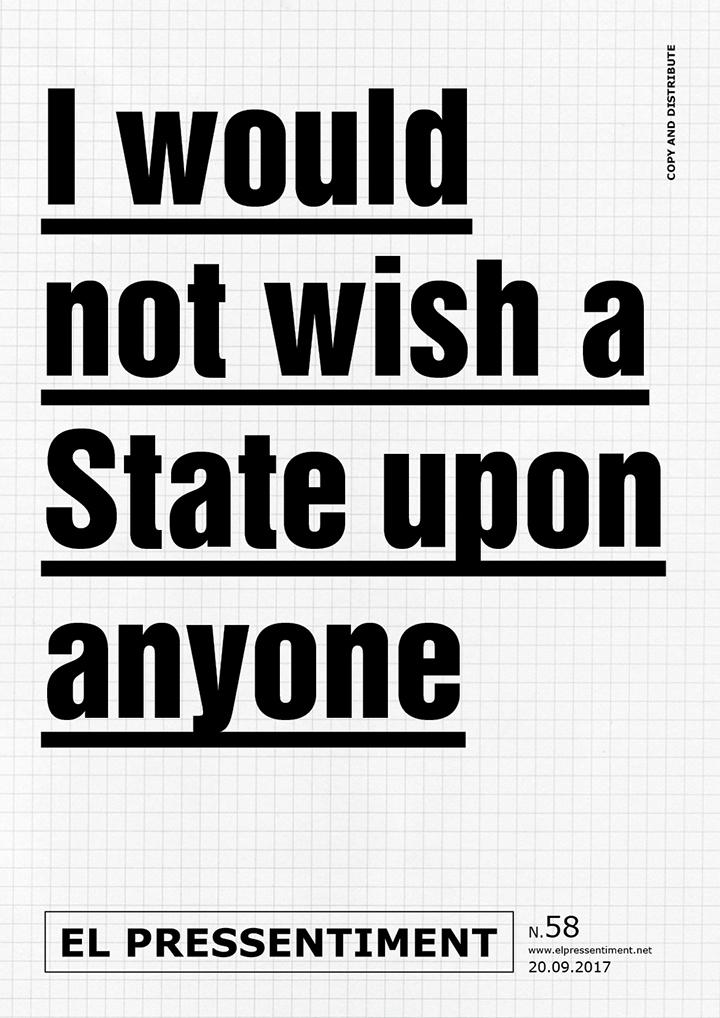

Voting in Catalonia
The independence of Catalonia is a complicated issue. It may have entered the European public discourse with a blast, partly due to the referendum and partly due to the raw and disproportionate suppressive violence that the - addicted to this sort of behaviors – centralized Spanish state exercised, however it is a matter that occurred and has been solidly developing throughout the years.Any approach to understand this issue must leave aside obsessional ideological fermatas and simplistic slogans. Examples of this style are references such as “from national to class emancipation” or a vague “solidarity with the people of Catalonia”. Those who delve deeper into the issue of Catalonian independence must make themselves familiar, at least to a certain extent, with the conditions within which this issue arose. Therefore, it is important to us, before expressing any opinion, to make a short historical account of the political, social, economic and class aspects that constitute the Catalan issue.
After the death of Franco and the Spanish Transition to democracy, the 1978 constitution was enacted that divided the Spanish state (and nation, according to the constitution) to 17 autonomous communities with increased self-organized jurisdictions. This was a negative development for the supporters of a complete independence of territories such as the Basque Country or Catalonia. It also signified a shift from the centralized Francoist model to a model that provided the Autonomous regions with the ability to decide on their own, on issues regarding, amongst others, culture, public transport, public order and so on. Policy areas such as healthcare, education and justice were subject to a shared jurisdiction with the Spanish state. One initial observation to make is the fact that the approval of the Autonomous regions system was set to a referendum, for various reasons, to solely four regions: Galicia, Andalusia, Catalonia and the Basque country. In 1979 in Catalonia, 88% of the voters voted for the constitutional (under the auspices of Spain) Autonomy, a result that significantly weakened the dynamics for a potential struggle for complete independence. Likewise, in the Basque country, 90% of the voters voted YES, against the 10%, supported by Herri Batasuna and ETA, who wished complete independence.
A minor comment here: Catalonia’s Autonomy does not include the Autonomy of the community of Valencia or the Balearic Islands, regions where Catalan dialects are broadly spoken and related cultural traditions have survived. Pancatalanism, as a nationalist ideology, includes regions such as one part of Aragon, part of southern France and the Principality of Andorra. The referendum that took place on October 1, 2017, concerned only the Autonomy of Catalonia. The rest of “Catalan Countries” (as defined by the nationalist ideology) wish neither to be independent nor a potential union with Catalonia.
In 2005, there was an attempt to change the status of the Autonomy of Catalonia, involving improved conditions that allowed a greater autonomy and, mainly, the abandonment of Catalonia’s obligation to financially support the rest of the Spanish Autonomies. The government bill was eventually blocked in 2010 by the Constitutional Court of Spain, despite the fact that it had been approved (74% of the voters, 51% electoral abstention) by a referendum in Catalonia in 2006. Catalonia has had one of the highest GDP rates in comparison to the rest of the Autonomies for several years now, before and after the 2008 financial crisis. A large part of these revenues is allocated for the economic support of the financially weaker Autonomies. This system of state redistribution of resources was what the Catalan bourgeoisie has aimed to get rid of, but has failed. This is actually one of the main disputes in the current situation, which is directly related to the formation of a Catalan state tax collecting mechanism that will not be accountable to the central Spanish government.
The financial aspect of the Catalan issue consists of two main axes. First, the Catalan capital does not wish independence from Spain, because this event would directly imply exit from the Eurozone, political instability and the loss of the status of duty free exports for its products to its main target market, namely the Spanish as well as the European. However, the Catalan capital wishes the Autonomy of Catalonia but with upgraded jurisdictions, since only then it will gain a privileged position because its interest will be directly accommodated by the neoliberal Catalan governmental alliance, which will have thrown away Madrid’s centralized financial control and the obligation to channel part of its revenues to the rest of the Spanish regions. Simultaneously, an enlarged autonomy could pave the way for direct negotiations with the EU and demands for increased EU resources, a recurring demand of the Catalan capital and the Catalan government that are skeptical to an equal distribution of European funds amongst the financially weaker Spanish Autonomies. This demand is also made evident through the rhetoric that accompanied the narrative of independence: the initiators of the referendum wish a Catalonia within the Eurozone, as part of the EU, as member of NATO and do not propagate for any political or economic rupture in the case of independence.

The second axe concerns the class background of the demand for independence. Based on data sourcing from the Catalan statistical authority, the statistical profile of the supporters of independence is citizens with middle or high income, of Catalan origin that goes all the way to their grandparents, and higher education. The lower the income and the educational status of a citizen is, the lower the support to independence. In other words, if someone would attempt to define simplistically the class background of the vote, this would be “the rich vote for independence”. The poor, “the common people” as a populist approach would say, are largely against independence or indifferent. Correspondingly, in wealthy areas of the Catalan province, where families-bearers of the Catalan tradition live, independence is entirely accepted in comparison to the e.g. class differentiated area of Barcelona’s suburbs. In any case, the opinion surveys of the Catalan media showed before the referendum and the violent intervention of the Spanish state that only 42% supported full independence. In conclusion, the Catalan bourgeoisie, which is represented by the governing alliance of president Puigdemont and consists of a center-right wing party (which has repeatedly cooperated in the Spanish central political arena with the center-right wing PP supporting austerity policies) and the Catalan social-democratic party, propagates independence but they do not wish independence. They only wish a broadened financial autonomy.
This text was conceived and came to life the day after the referendum. The course of events confirms our argument, given that during the well-expected historical declaration of independence, on Tuesday October 10, Puigdemont did not have the slightest problem to ignore the “popular will” of thousands of people that he manipulated and mobilized, those who stood outside the parliament and waited for the declaration of independence. Puigdemont served the interests of those who support him. With an abstract statement, he threw the ball back to Madrid: “Let’s negotiate, let’s see what you can offer us” was the bottom line of his statement.
Nevertheless, the right-wing Spanish government through its non-tolerant stance, which united its voters and made itself appear as the only “responsible” actor in this crisis, inflexibly continues demanding president Puigdemont to clarify his stance, so the Spanish state will be in a position to have knowledge of whether it will declare Catalonia in a state of emergency or not and overthrow Catalonia’s elected leadership. This development would be the only solution regardless the result of the referendum and the timing of such an event. No state hands over its power and territory without consequences. When it comes to the unhappy crowd that left the streets around the parliament in silence, they should be aware that this is what happens when they are asked to take a stance for or against a state imposed dilemma and to act within a framework defined by the ruling political and economic elites.
As expected, the events in Catalonia also engaged the anarchist movement. Several reasons lie behind this: the history of Barcelona in regards to the anarchist movement, the violent police suppression of Catalonians, the consequent strike, the “direct democracy” narrative that accompany referendums, as well as the correlation between a national liberation sensation and a revolutionary prospect and social subversion are some of the main reasons.
With regard to the historic relation of anarchists and Catalan nationalists, their relationships had been – with minor exceptions- of the worst kind. CNT reached the audiences of poor workers that swarmed in Barcelona to work in the factories of the Catalan capital. Before the 1934 uprising, when autonomists cooperated with the socialists against the right-wing ruled state, the Catalan rebel government detained a great number of CNT militants to prevent the anarchists from taking action in the region. The Catalan cops of 1931-36 where unceasing torturers of anarchist activists. Catalan politicians on the other hand had leading roles in the political machinations against CNT-FAI during the civil war and the events of May 1937 and – since the Communist Party was non-existent in Catalonia-, they took the initiative to deter the Revolution through their dilatory actions. The only sentimental commonality that ever existed between anarchists and Catalan autonomists overtime was one of hatred against the central fascist state of Madrid, especially during the dictatorship.
With regard to police brutality, we are obviously against any similar instances of cops against crowds of protestors, let alone against a peaceful and unarmed crowd who only cries out “Votarem”, meaning “we will vote”. We stand against any repressive mechanism and the state of terror that has been imposed over many areas of Catalonia. Unfortunately though, there was no global condemnation when the Mossos d’Esquadra, the police force of the Autonomy of Catalonia, was indiscriminately beating protestors of austerity, was taking out eyeballs of our comrades using plastic bullets, was enforcing the evictions of home residencies over debts, when it repressed all strike rallies, the Indignados movement, the libertarian squats and so on. The logic of victimization played a role in favor of the Catalan government’s goal, but we, as anarchists, as the usual candidates for state repression, we ought to comprehend the limits between sympathy and solidarity. It is not a coincidence that more severe state repression against movements with popular support takes place in many places in the world, movements that were fomented by reactionary elites or are imbued with disputable demands. For this kind of repression, it is difficult for us to comment and to adopt a clear position as a political movement.
We stood in solidarity with the struggle of Catalan protestors when they encircled the Catalan Parliament (while the Catalan middle-right wing party was in power) in 2011, forcing the politicians to enter the Parliament by helicopters in order to vote for the austerity budget. We stood in solidarity with anarchists when the Catalan police participated in the “antiterrorist” raids of Operation Pandora or cracked down on our comrades who were striving to hold on the Can Vies squat. However, solidarity grows on and results from common visions; otherwise, it is reduced to mere expression of sympathy and in this case, the dispute, the vision, is a Catalan independence as a demand and pursuit by the Catalan bourgeoisie.

The support of the demand for independence by the anticapitalist CUP (Popular Party) is not a sufficient condition to make as stand in solidarity with the Catalan cause, since the question of the referendum, the terms for a possible independence, the reason why it takes place, are all elements evidently alien to any libertarian logic, to any social emancipation concept. This sort of Independence is not accompanied by a program of self-determination and autonomy neither by a prospect of federalization of the Spanish territory. The anticapitalist and libertarian cause would be the first to receive repression in an independent Catalonia, an independent Catalonia that would be the result of the political powers that pursue it. An independence with no social and communal characteristics, with no class characteristics, with no revolutionary program, has nothing to do with libertarian principles. As anarchists, we do not believe in the theory of stages, in good and worse states, but we believe in self-determination, anti-hierarchy and direct action. When we abolish our fundamental principles and adopt the logic of “lesser evil”, “realism” and adaptivity, we are in great danger of becoming mere supporters of state planning.
If the referendum in Catalonia had been the result of popular pressure with liberal characteristics, this discussion would take place on a completely different basis. Unfortunately, part of the people who align themselves with the plans of the Catalan government, are the same people that fought against austerity, in favor of self-determination through the indignados movement, against the very governmental elite that organized the referendum. Today they stand allied with this elite, influenced by the all-powerful nationalist paradigm, decorated with a little bit of anti-Francoism, Barcelona FC and pacifist civil disobedience. The readiness by which an anti-systemic social predisposition can be channeled towards patriotic and nationalist ideologies is something that we need to contemplate on.
In Spain, like in Greece, the goal of the revolutionary movement is to regroup after the successive repressive blows that it suffered and after the social dejection caused by austerity and by the failure of the Movements of the Squares and work constantly and by plan driven by libertarian demands. Delegating our lives to the hands of political parties, politicians and enlightened avant-gardes will never deliver the desired outcome. The pursuit of political instability can only bear fruit when there are grassroots organizations and structures from below, to grasp it and use it for opening prospects of struggle, prospects of social and class emancipation. Otherwise, we just pave the way to reaction and state organization.
Δ.Β. and Κ.Φ., two anarchists from Athens
Two anarchists from Athens